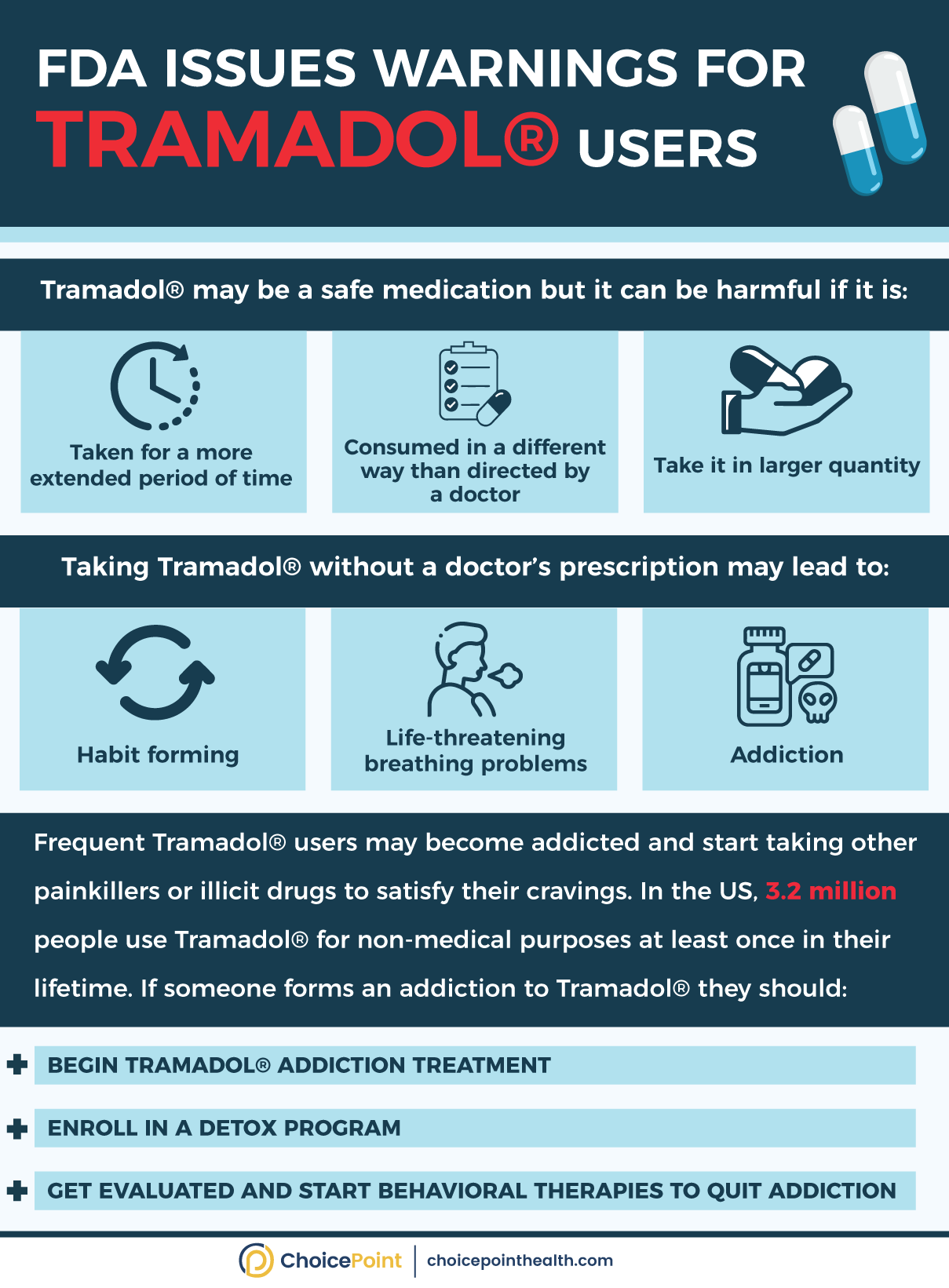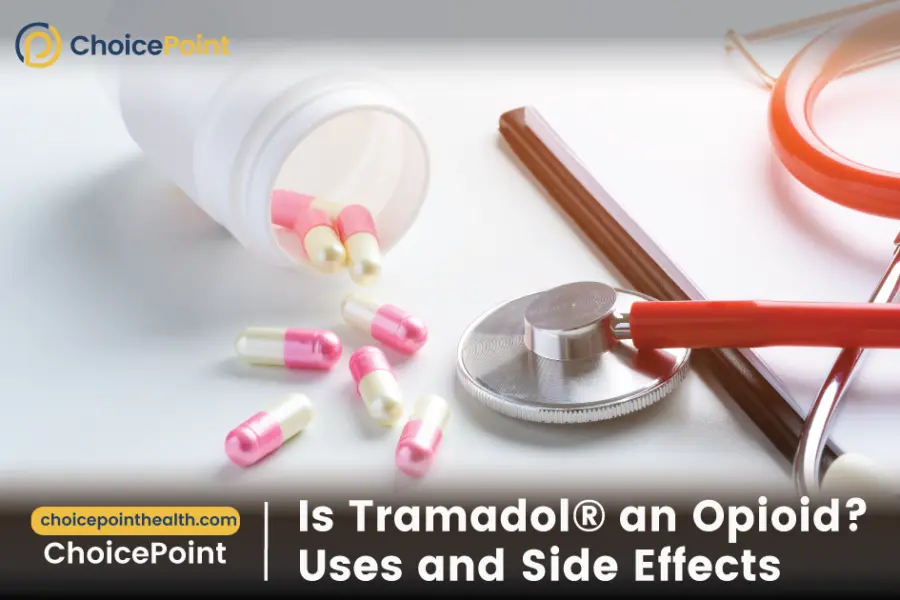Tramadol® may carry a risk of misuse and addiction. As it is a schedule IV controlled substance, it treats moderate to severe pain. However, when used correctly, it may ease opioid cravings and withdrawal symptoms. This is why it is preferred during MAT programs for people who battle opioid dependence. Is Tramadol an Opioid? Keep reading and find out more!
Table of Contents
What Is Tramadol- A Brief Introduction
- Tramadol® is an FDA-approved controlled substance.
- Its generic name is Tramadol®, and its brand name includes Ultram®, Ultram ER®, and ConZip®.
- Both immediate-release and extended-release Tramadol® oral pills are available.
- The pain of any intensity can be treated with Tramadol®.
- It can only be used under the direct supervision of a physician because of its potential for abuse and dependence.
Is Tramadol An Opioid?
“Yes, Tramadol® is a synthetic opioid analgesic, and it is used to treat physical pain.”– says Jordyn Mastrodomenic, Clinical Director at ChoicePoint. It is believed to have a pain-relieving potency one-tenth that of Morphine. Therefore also regarded as a relatively effective painkiller.
Tramadol Uses
Tramadol® blocks the transmission of pain signals from nerves in the central nervous system to the brain, decreasing pain perception. Following are some more uses of Tramadol®:
- Treating pain ranging from moderate to severe.
- It impacts the brain and changes how your body experiences and response to pain.
- Tramadol® may be used in conjunction with therapies during a MAT program.
- It may be used if other non-opioid pain management methods have failed to control pain or are intolerable.
- Effective in treating Opioid withdrawal symptoms.
Tramadol Side Effects- When You Should Be Concerned?
After using this drug for some time, some of these adverse effects could become less noticeable. But if any side effects persist or worsen, tell your healthcare provider immediately because your doctor prescribed this medication after careful evaluation. Therefore, considering your condition, the benefits may outweigh the risk of adverse effects. However, The adverse side effects of Tramadol® are usually not intense.

What Are the Dangers of Taking Tramadol®?
Here are some of the commonly reported Tramadol side effects:
Mood
- sense of well-being
- relaxation
- euphoria
Physical
- pain relief
- constipation
- a slower rate of breathing
- dizziness
- fatigue
- headaches
- itching
- nausea
- vomiting
- sweating
- erectile dysfunction
Psychological
- confusion
Operating heavy machinery, driving, or engaging in any other risky activity should be avoided until you understand how this medication affects you. Don’t take Tramadol side effects lightly, and call your doctor if you notice any of the following severe Tramadol side effects:
- noisy breathing,
- breathing that stops during sleep
- a slow heart rate or weak pulse
- lightheadedness
- seizure
- low cortisol levels
Tramadol® may increase serotonin levels and sometimes cause a severe condition known as “serotonin syndrome/toxicity.”
Symptoms of Serotonin Syndrome are:
- fast heartbeat
- hallucinations
- loss of coordination
- dizziness
- twitching muscles
- unexplained fever
- unusual restlessness
We try our best to bring you the most authentic information, but this is not a complete list of possible side effects. Contact ChoicePoint at 844.445.2563 if you notice Tramadol side effects and discuss treatment plans with our DEA-certified staff.
Tramadol Side Effects In Elderly
Elderly people are more vulnerable to Tramadol’s cognitive side effects. Additionally, they are more likely to experience additional negative side effects, such as nausea, lung issues, dizziness, and fainting. Therefore, it is highly advised that everyone should always follow a doctor’s instructions and never take more medication than is recommended.
Dangers of Mixing Tramadol and Alcohol
Since both drugs depress the central nervous system and have the potential to kill or seriously harm the brain, mixing Tramadol and Alcohol is extremely dangerous. Combining Tramadol and Alcohol could increase their sedative and respiratory-suppressing effects, resulting in overdose, unconsciousness, coma, or death. Mixing Tramadol® and Alcohol may also result in an overdose that necessitates rapid medical assistance.
Warning signs of Tramadol overdose may include:
- Increased heart rate.
- Cold, sweaty skin.
- Excessive sleepiness.
- Loss of muscle control.
- Pinpoint pupils.
- Trouble breathing.
ChoicePoint is a co-occurring addiction treatment center where patients may be treated for Tramadol overdose under the supervision of DEA-certified doctors. Call 844.445.2563 and schedule a virtual or in-person appointment today!
Is Tramadol A Controlled Substance?
Yes, all states in the US consider tramadol® to be a controlled substance. Tramadol® has the potential to cause physical and mental dependence. Five categories are used to classify controlled substances (schedules). Tramadol® is included in Schedule IV.
Is Tramadol Addictive?- Risks of Tramadol Abuse
Now that you have got your answer to ‘Is Tramadol an Opioid’ in the affirmative, it is time to address another important question: Is Tramadol addictive? Many people think Tramadol is safe since it has less potency than other prescription opioids. Unfortunately, because of this misunderstanding, some believe the medicine is safe. However, in reality, it is also addictive if taken in any other way other than directed by your doctor. Even with a prescription, abusing it increases your risk of becoming addicted.
ChoicePoint is a drug rehab center that wants to assist you if you believe that you or a loved one has an addiction to Tramadol® or other opioids. Call 844.445.2563 and speak with our ever-ready addiction specialists.
Are You Ready to Get Help from ChoicePoint?
Tramadol® is best used in a controlled environment, like during a MAT program. However, if you or someone does not follow the doctor’s instructions, Tramadol® use may lead to abuse. If you or a loved one is battling Tramadol addiction, a medical detox may be the right path for you! ChoicePoint, an addiction treatment center, may reduce the risk of addiction by providing 24/7 medical detox! Call 844.445.2563 to schedule an appointment now!
Medical Disclaimer:
ChoicePoint aims to improve the quality of life for people struggling with substance use disorder and mental health issues. Our team of licensed medical professionals research, edit and review the content before publishing. However, this information is not intended to be a substitute for professional medical advice, diagnosis, or treatment. For medical advice please consult your physicians or ChoicePoint's qualified staff.










Review Is Tramadol an Opioid? Uses and Side Effects.